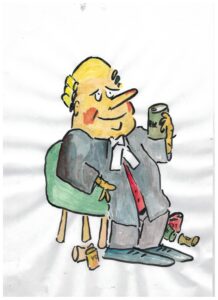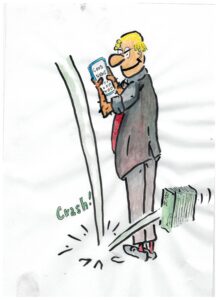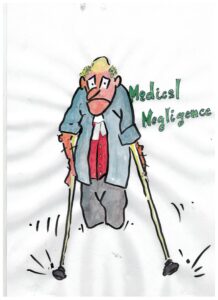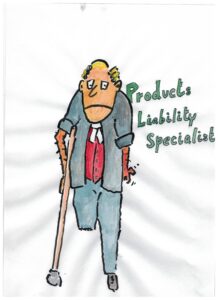Review sites, testimonials and chat rooms as evidence to prove your case in court. Sorry, no way!
In Briginshaw v Briginshaw [1938] HCA 34; (1938) 60 CLR 336 at 361-362, Dixon J stated:
“[W]hen the law requires the proof of any fact, the tribunal must feel an actual persuasion of its occurrence or existence before it can be found. It cannot be found as a result of a mere mechanical comparison of probabilities independent of any belief in its reality…it is enough that the affirmative of an allegation is made out to the reasonable satisfaction of the tribunal. But reasonable satisfaction is not a state of mind that is attained or established independently of the nature and consequence of the fact or facts to be proved. The seriousness of an allegation made, the inherent unlikelihood of an occurrence of a given description, or the gravity of the consequences flowing from a particular finding are considerations which must affect the answer to the question whether the issue has been proved to the reasonable satisfaction of the tribunal.”
As the follow extract shows, it is near on impossible to use information on internet user groups, chat rooms, review sites and even testamonials as evidence to support your case………
The following case concerned a claim for a new vehicle in circumstances where the engine of the newly purchased vehicle leaked significant amounts of oil. There was no expert evidence to support the proposition that the engine was in some way not merchantable.
Askounis v Nissan Australia P/L (Motor Vehicle) [2007] NSWCTTT 389 (13 July 2007)
- The Tribunal is bound by section 28 of the Consumer, Trader and Tenancy Tribunal Act 2001 which sets out the way in which proceedings are to be conducted. It provides as follows:
(2) The Tribunal is not bound by the rules of evidence and may inquire into and inform itself on any matter in such manner as it thinks fit, subject to the rules of procedural fairness.
(3) The Tribunal is to act with as little formality as the circumstances of the case permit and according to equity, good conscience and the substantial merits of the case without regard to technicalities or legal form.
- Ordinarily in Tribunal proceedings parties rely on their own evidence, the reports of experts, documents about their particular case or transaction. In this case, however, in relation to the Applicant’s contention that the 2006 model’s engine has a design or manufacturing flaw, the Applicant has submitted no expert’s report, only pages downloaded from websites where consumers have been sharing their experiences with Nissan cars.
- The first issue is whether this should be admitted as evidence in the proceedings.
- I do not see any difficulty in this particular case in accepting that, in the absence of evidence to the contrary, the author, recipient, date and contents of the document are all as stated on the face of each of the documents or the admissibility of these documents. These documents were served on the Respondent and it has not sought to challenge the documents themselves in any way. The Respondent does however challenge the inferences that the Applicant says the Tribunal should draw from these documents.
- I note that in previous cases the Tribunal has admitted material downloaded from the internet.
- In Newhouse v Nokia Australia P/L [2002] NSWCTTT 499 an applicant sought an order from the Tribunal for the replacement of a faulty phone. The applicant tendered only documents downloaded from the internet to prove that the problem was a manufacturing or design flaw. The Respondent in the case submitted it did not accept information from third party websites as “proper forums for information pertaining to its products.” The Tribunal admitted the documents however dismissed the application on the basis that there was “ no evidence, other than the internet articles, that the problem with the phone was due to any default by the manufacturer. I do not accept that the internet articles are specific enough to allow me to make the finding that the problem with the phone is due to a breach by the manufacturer.”
- In the matter of Ambula P/L t/as Aluminium Engineering v Simpson & Ors [2003] NSWCTTT 125, again the documents downloaded from the internet were admitted into evidence however the Tribunal was not persuaded by the contents of the documents:
“The unsworn evidence of people who wrote to Mr Wright or who participated in e-mail chat rooms as to what had happened to their vehicles when fitted with Zeus gears is not persuasive. I have no evidence as to the expertise of these people. While the Tribunal is not bound by the rules of evidence clearly certain kinds of evidence carry more weight than others.”
- It seems to me that in cases such as these involving consumer goods, consumer comments can be admitted into evidence, perhaps not individually, but cumulatively. The weight to be given to the material will, of course, be a matter to be decided on a case-by-case basis.
- The Applicant has reproduced this internet material for the Tribunal for two purposes – to support his case that the car is not of merchantable quality and secondly to support his argument that as this model of car is so unreliable/problematic the only remedy appropriate is a full refund.
- The only Australian case which the Tribunal was specifically referred to during the hearing was downloaded from the internet. It was included in the documents on which the Applicant relied in the hearing and was said to be from a Jim in Melbourne. The relevant part of the document, dated 17 February 2007, reads as follows:
“My name is also Jim and unfortunately I have the same oil burn problem with my new 2006 350Z Track. Am currently taking Nissan through the tribunal for a refund on the car. Up until we went to the tribunal, Nissan have been playing hardball. They have finally admitted to there being a problem and as in your case are willing to replace my engine.”
- On 19 February 2007 Jim from Melbourne wrote:
“After much hassling the engine was replaced in about 10 weeks as they argued over who should do it because it was a warrantee (sic) fix and no money in it…….Once I got it back everything was great for about 5 months, then disaster. Nissan mechanics have little experience in replacing engines in Z’s and in doing it they forgot to properly tighten up two bolts that hold in a small metal guide bracket that sits behind the timing chain. It detached itself, it got jammed between the timing chain and the gear that drives the water pump. The radiator blew itself to kingdom come and all the hoses from it………..Get rid of it, you have a lemon, one of the few Z’s that are such, but a lemon all the same.”
- Although I was not specifically referred to the following cases during the Tribunal hearing, I note that there were two other cases from Australia in the papers relied on by the Applicant. One person wrote on 12 October 2006 in relation to an 06 Z Roadster Track:
“I have recently purchased an 06 Z roadster Track. The car has about 9500km on it. At about 7500km it began consuming oil, it currently consumes about 500ml per 1000km” The person next wrote on 13 October 2006 “Nissan have placed the car on an oil watch, which means taking the car back every 1000km and measuring the oil loss, they will do this 3 times and the final one lines up with the 10k service. Looks like I may be getting a new engine.”
- There was one further internet comment dated 24 February 2007 which without identifying the model of the car, said:
Nissan Australia are telling us that it’s not a problem, oil loss and pinging is “within acceptable tolerances.” Can you believe these guys??? They say it’s a one off, not a pandemic problem. Blaming me initially for not running in the car properly and then saying I don’t drive it hard enough? What the? After changing the motor, they ran it in, guess what? Same again!”
- The Applicant is asking the Tribunal to find, in effect, that the design or manufacture of the 2006 model is defective in some way. In relation to the Australian experience, I have the evidence of, at most, five consumers using this model engine who encountered the problem. (I am including the Applicant’s engine, and the two engines said to have failed one of the consumers in the documents filed.) However, I have no evidence of how many of this model car have been sold in Australia. I have no evidence from any experts as to whether the design/manufacture of the engine is defective. On the other hand, I have the evidence of Mr Prior, although obviously not independent, that he has never encountered this problem with this model before, despite his responsibility for twelve dealerships in NSW.
- In this case, although the Applicant told me that the Australian models and the US models were identical, I have no evidence that this is so. Again I have no evidence of what proportion of the vehicles have these problems compared to how many vehicles are sold.
- The Applicant was, I believe, inviting me to draw an inference that the model of car was defective because Nissan had changed the design to the extent of 80%. The Applicant said that this information was from Nissan’s own information. No such information was made available to the Tribunal. Mr Prior did not confirm nor deny this. In any case, even if I were to accept there was such a change to the design of the engine, I cannot, simply from this, infer that the engine design of the 2006 model was defective.
- The Tribunal in making a finding must only do so if it is satisfied on the balance of probabilities. The Tribunal must, when considering whether a matter has been established on the balance of probabilities have regard to, among other things, the seriousness of the finding it is being asked to make. In the case of Briginshaw v Briginshaw [1938] HCA 34; (1938) 60 CLR 336 at 361-362, Dixon J stated:
“[W]hen the law requires the proof of any fact, the tribunal must feel an actual persuasion of its occurrence or existence before it can be found. It cannot be found as a result of a mere mechanical comparison of probabilities independent of any belief in its reality…it is enough that the affirmative of an allegation is made out to the reasonable satisfaction of the tribunal. But reasonable satisfaction is not a state of mind that is attained or established independently of the nature and consequence of the fact or facts to be proved. The seriousness of an allegation made, the inherent unlikelihood of an occurrence of a given description, or the gravity of the consequences flowing from a particular finding are considerations which must affect the answer to the question whether the issue has been proved to the reasonable satisfaction of the tribunal.”
SEARCH BLOG POSTS
LATEST BLOG POSTS
- Updated product safety mandatory reporting guidance for suppliers now available
- Pleading fraud – cause and effect is essential
- Does the Trustee’s right of indemnity have priority over the right of beneficiaries in relation to assets?
- Rules of war (in a nutshell) | The Laws Of War
- MH370 Final Report
Past Blog Posts
- December 2021
- September 2021
- August 2021
- May 2021
- April 2021
- March 2021
- August 2020
- February 2020
- September 2019
- February 2019
- December 2018
- July 2018
- April 2018
- December 2017
- May 2017
- February 2017
- December 2016
- November 2016
- October 2016
- September 2016
- August 2016
- April 2016
- March 2016
- October 2015
- September 2015
- August 2015
- May 2014
- April 2014
- March 2014
- January 2014
Categories
- Appeals
- Artificial Intelligence
- Aviation law
- Banking and Finance Law
- Blogs
- Civil Liability Act
- Class Actions
- Coding for lawyers
- common law
- Consumer Claims (TPA)
- Contract Law
- Contractual Interpretation
- Criminal law
- Deeds
- Docassemble
- duty of care
- Engineering Law
- Equity
- Evidence
- Exclusion Clauses
- Execution of documents
- Expert Witness
- featured
- Financial Services
- Fraud
- Fundraising (Chapter 6D)
- General comment
- Home Building Law
- Insurance
- Legal drafting
- Local Court
- Medical Negligence
- MH370
- Motor Accidents
- Negligence
- Occupiers negligence
- Other
- Personal Injury
- Personal Property Securities (PPSA)
- Pleading
- Practice & Procedure
- Products Liability
- Property
- Real Property
- Reasons for a decision
- Securitisation
- Security (Mortgages & Charges)
- Sentencing
- Swaps & Derivatives
- Teaching
- Transactional Law
- Transfer of financial assets in transactions
- Trusts & Trustee Law
- Uncategorized
- War and Weaponry
- Witnesses
SEARCH BLOG POSTS
LATEST BLOG POSTS
- Updated product safety mandatory reporting guidance for suppliers now available
- Pleading fraud – cause and effect is essential
- Does the Trustee’s right of indemnity have priority over the right of beneficiaries in relation to assets?
- Rules of war (in a nutshell) | The Laws Of War
- MH370 Final Report
Past Blog Posts
- December 2021
- September 2021
- August 2021
- May 2021
- April 2021
- March 2021
- August 2020
- February 2020
- September 2019
- February 2019
- December 2018
- July 2018
- April 2018
- December 2017
- May 2017
- February 2017
- December 2016
- November 2016
- October 2016
- September 2016
- August 2016
- April 2016
- March 2016
- October 2015
- September 2015
- August 2015
- May 2014
- April 2014
- March 2014
- January 2014
Categories
- Appeals
- Artificial Intelligence
- Aviation law
- Banking and Finance Law
- Blogs
- Civil Liability Act
- Class Actions
- Coding for lawyers
- common law
- Consumer Claims (TPA)
- Contract Law
- Contractual Interpretation
- Criminal law
- Deeds
- Docassemble
- duty of care
- Engineering Law
- Equity
- Evidence
- Exclusion Clauses
- Execution of documents
- Expert Witness
- featured
- Financial Services
- Fraud
- Fundraising (Chapter 6D)
- General comment
- Home Building Law
- Insurance
- Legal drafting
- Local Court
- Medical Negligence
- MH370
- Motor Accidents
- Negligence
- Occupiers negligence
- Other
- Personal Injury
- Personal Property Securities (PPSA)
- Pleading
- Practice & Procedure
- Products Liability
- Property
- Real Property
- Reasons for a decision
- Securitisation
- Security (Mortgages & Charges)
- Sentencing
- Swaps & Derivatives
- Teaching
- Transactional Law
- Transfer of financial assets in transactions
- Trusts & Trustee Law
- Uncategorized
- War and Weaponry
- Witnesses




